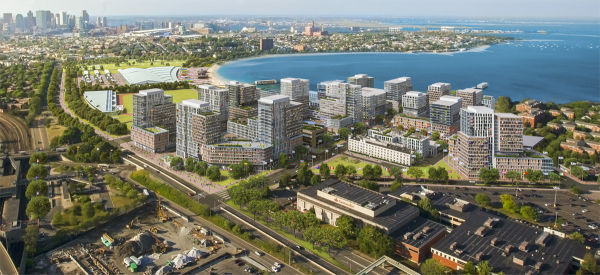August 2, 2017

On Wednesday, the Boston Globe editorial board published an extraordinary lament about the failed Boston 2024 Olympics bid. The context: Los Angeles has been selected to host the Summer Games in 2028— a “cause for congratulations,” according to the Globe.
Of course, the shout-out to our friends in California was merely the rhetorical hook to get to the newspaper’s chief exercise: a screed castigating our collective failure to capitalize on a “once in a lifetime chance” to “move Boston beyond gangster films and Freedom Trail platitudes.”
The editorial goes on: “Sure, Boston 2024 stirred up discord, but the Olympics bid foundered prematurely, subsumed by early PR mistakes that allowed NIMBYism to take root. Yet the effort also touched off a much-needed civic dialogue about the city’s built environment and its transportation infrastructure.”
The euphemistic shorthand — “early PR mistakes”— used to describe the outright falsehoods that were pitched by Boston 2024 boosters is stunning for its tone-deafness and revisionism. Facts really do matter. They mattered, thankfully, in 2015 when this Boston bid was unveiled and scrutinized.
A public alerted to the financial pitfalls that haunted other Olympic cities was well served by advocates and reporters who looked deeply into the Boston bid. In the local context, that meant challenging the bold assertion by 2024 organizers that no new public funds would be needed to pay for the massive infrastructure improvements that would be necessary to host the events.
That was clearly not the case at Dorchester’s Columbia Point, envisioned as the site for a sprawling Athletes’ Village. JFK-UMass station and Kosciuszko Circle would need to be rebuilt and Boston 2024 officials told the public those were projects already in the state budget pipeline. In fact, not only were no funds lined up to do such a project, but there also was no active plan to modernize the rotary or the MBTA facility. There still isn’t.
The argument that Boston 2024 has triggered a wave of planning that otherwise would not have happened just does not hold up, at least not here in Dorchester. There has been no new city or state planning activity to “fix” the traffic circle. There’s no new MBTA station in the works at JFK-UMass. A project to improve Morrissey Boulevard— an effort that’s presently funded only for a $3.1 million design phase— is totally unrelated to the 2024 discussion and does not include Kosciuszko Circle.
In fact, it may be that the abortive Olympics bid began a cycle of disruption on the Columbia Point peninsula that has been in stuck in neutral ever since. Four city-approved building projects— including a five-story residential complex, a hotel expansion, a car dealership, and a new Boston Teachers Union headquarters— were interrupted as the Olympics bid surfaced and targeted this area. UMass Boston, a key party to the Boston 2024 bid, was central to blocking or delaying three of those projects. And it’s fair to say that uncertainty about the fate of the Globe property — which went under agreement for the third time in four years this week— has at least been a contributing factor in the paralysis on the Point.
Isn’t it a bit ironic: Olympic skeptics are painted as NIMBYists for not plunging our heads in the sand and playing ball with the IOC and Boston 2024. But actual brick-and-mortar projects— new homes, businesses, and institutions, all supported by neighbors and city planners— have been killed or mothballed as powerful interests swirl around us. So who’s really been an impediment to economic development in this neighborhood?
A decade ago, Dorchester residents and stakeholders spent several years patching together a master plan that envisioned tremendous growth in this part of the neighborhood. Thousands of new homes, unprecedented height and density, mixed-use office and retail, new streets, pedestrian-and-cyclist friendly routes, and green spaces are outlined in the Columbia Point Master Plan that was created by a task force of Dorchester neighbors with city planners. It was published in 2011, well before anyone contemplated an Olympics, and could stand to be refreshed a bit. We’ve called for that repeatedly since the Olympics bid got pulled. It’s now long overdue.
We don’t need a lecture from Globe editors on how we swung and missed at a “once in a lifetime” opportunity. The city is booming. The cranes are swinging, and Boston is in high gear. Let’s get back to the business of fine-tuning the well-considered plans that Boston people were pushing ahead well before we were so rudely interrupted.


